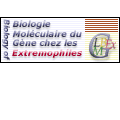
|
|















|
International Summer School
From Genome to Life:
Structural, Functional and Evolutionary approaches
MOCAN Iulia |
|
IBGC, UMR 5095, Gironde, 1, Rue Camille Saint-Saens, Bordeaux 33077, France title: Quaternary structure evolution &endash; the nucleoside diphosphate kinases Nucleoside-diphosphate kinases (NDPK) are oligomeric enzymes, built of small subunits (140-155 amino acids), with a high similarity of sequence (more than 40% identity). Studies of X-ray cristalography show that eucaryotic NDPK are hexameric, while at bacteria we can find some species with native hexameric NDPK (Bacillus subtilis, Deinococcus radiodurans), and other with tetrameric NDPK (for example Myxococcus xanthus and Escherichia coli). The characteristic that makes them unique among the other proteins is that the nucleoside-diphosphate kinases are similar proteins that can have different quaternary structure. Both tetramers and hexamers are constructed by assembling differently identical dimers. For example, the Dictyostelium and Myxococcus NDPK dimers overlap perfectly; three dimers associate to form a hexamer, and two dimers in the form of a tetramer. The subunit interactions differ, though, at the two types of quaternary structure: in the hexameric enzyme the amino acids in the C-terminus interact with the neighbouring dimer, while at Myxococcus the C-terminus is shorter and interacts with the neighbouring subunit of the same dimer (Lascu et al., 2000). If we try to predict an enzyme’s structure just by observing its sequence we might be deceived: for example, at Mycobacterium tuberculosis the sequence of NDPK is shorter in C-terminus which could lead us to think that it is a tetramer. But our biochemical studies, confirmed by X-ray crystallography, show that it is, in fact a hexameric enzyme, with a high termostability (Chen et al., in press). The purpose of our study and of my thesis is to find out if there is a phylogenetic grouping of NDPK with the same structure, their biochemical properties and the significance of the quaternary structure for evolution. Lascu, I., Giartosio, A., Ransac, S., Erent, M. (2000). J. Bioenerg. Biomembr., 32, 227-236. Chen, Y., Morera, S., Mocan, I., Lascu, I., Janin, J. (2002). Proteins |